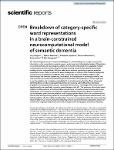Breakdown of category-specific word representations in a brain-constrained neurocomputational model of semantic dementia
| dc.contributor.author | Shtyrov, Y | |
| dc.contributor.author | Efremov, A | |
| dc.contributor.author | Kuptsova, A | |
| dc.contributor.author | Wennekers, T | |
| dc.contributor.author | Gutkin, B | |
| dc.contributor.author | Garagnani, M | |
| dc.date.accessioned | 2023-12-18T11:51:28Z | |
| dc.date.available | 2023-12-18T11:51:28Z | |
| dc.date.issued | 2023-11-10 | |
| dc.identifier.issn | 2045-2322 | |
| dc.identifier.issn | 2045-2322 | |
| dc.identifier.other | 19572 | |
| dc.identifier.uri | https://pearl.plymouth.ac.uk/handle/10026.1/21805 | |
| dc.description.abstract |
The neurobiological nature of semantic knowledge, i.e., the encoding and storage of conceptual information in the human brain, remains a poorly understood and hotly debated subject. Clinical data on semantic deficits and neuroimaging evidence from healthy individuals have suggested multiple cortical regions to be involved in the processing of meaning. These include semantic hubs (most notably, anterior temporal lobe, ATL) that take part in semantic processing in general as well as sensorimotor areas that process specific aspects/categories according to their modality. Biologically inspired neurocomputational models can help elucidate the exact roles of these regions in the functioning of the semantic system and, importantly, in its breakdown in neurological deficits. We used a neuroanatomically constrained computational model of frontotemporal cortices implicated in word acquisition and processing, and adapted it to simulate and explain the effects of semantic dementia (SD) on word processing abilities. SD is a devastating, yet insufficiently understood progressive neurodegenerative disease, characterised by semantic knowledge deterioration that is hypothesised to be specifically related to neural damage in the ATL. The behaviour of our brain-based model is in full accordance with clinical data—namely, word comprehension performance decreases as SD lesions in ATL progress, whereas word repetition abilities remain less affected. Furthermore, our model makes predictions about lesion- and category-specific effects of SD: our simulation results indicate that word processing should be more impaired for object- than for action-related words, and that degradation of white matter should produce more severe consequences than the same proportion of grey matter decay. In sum, the present results provide a neuromechanistic explanatory account of cortical-level language impairments observed during the onset and progress of semantic dementia. | |
| dc.format.extent | 19572- | |
| dc.format.medium | Electronic | |
| dc.language | en | |
| dc.publisher | Springer Science and Business Media LLC | |
| dc.subject | Humans | |
| dc.subject | Frontotemporal Dementia | |
| dc.subject | Neurodegenerative Diseases | |
| dc.subject | Temporal Lobe | |
| dc.subject | Brain | |
| dc.subject | Semantics | |
| dc.subject | Psychomotor Performance | |
| dc.subject | Magnetic Resonance Imaging | |
| dc.title | Breakdown of category-specific word representations in a brain-constrained neurocomputational model of semantic dementia | |
| dc.type | journal-article | |
| dc.type | Article | |
| plymouth.author-url | https://www.ncbi.nlm.nih.gov/pubmed/37949997 | |
| plymouth.issue | 1 | |
| plymouth.volume | 13 | |
| plymouth.publication-status | Published online | |
| plymouth.journal | Scientific Reports | |
| dc.identifier.doi | 10.1038/s41598-023-41922-8 | |
| plymouth.organisational-group | |Plymouth | |
| plymouth.organisational-group | |Plymouth|Faculty of Science and Engineering | |
| plymouth.organisational-group | |Plymouth|Faculty of Science and Engineering|School of Engineering, Computing and Mathematics | |
| plymouth.organisational-group | |Plymouth|REF 2021 Researchers by UoA | |
| plymouth.organisational-group | |Plymouth|Users by role | |
| plymouth.organisational-group | |Plymouth|Users by role|Academics | |
| plymouth.organisational-group | |Plymouth|REF 2021 Researchers by UoA|UoA11 Computer Science and Informatics | |
| plymouth.organisational-group | |Plymouth|Admin Group - REF | |
| plymouth.organisational-group | |Plymouth|Admin Group - REF|REF Admin Group - FoSE | |
| plymouth.organisational-group | |Plymouth|REF 2028 Researchers by UoA | |
| plymouth.organisational-group | |Plymouth|REF 2028 Researchers by UoA|UoA11 Computer Science and Informatics | |
| dc.publisher.place | England | |
| dcterms.dateAccepted | 2023-09-04 | |
| dc.date.updated | 2023-12-18T11:51:27Z | |
| dc.rights.embargodate | 2023-12-19 | |
| dc.identifier.eissn | 2045-2322 | |
| rioxxterms.versionofrecord | 10.1038/s41598-023-41922-8 |


